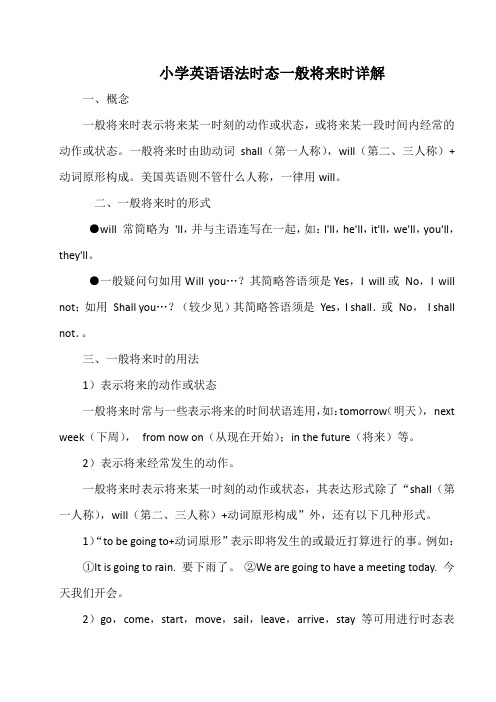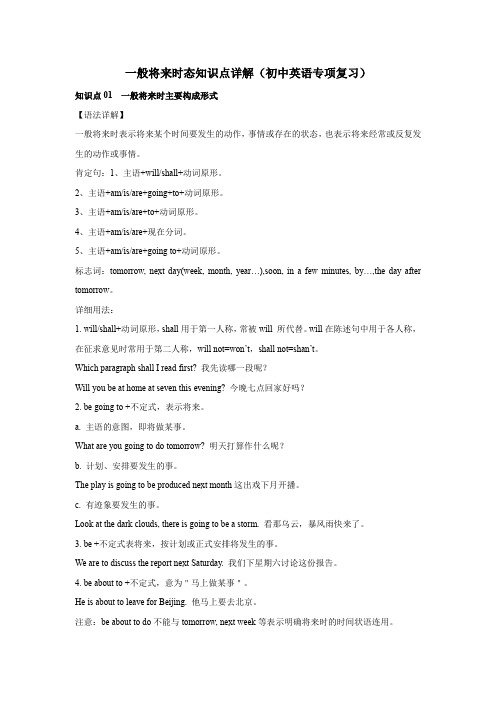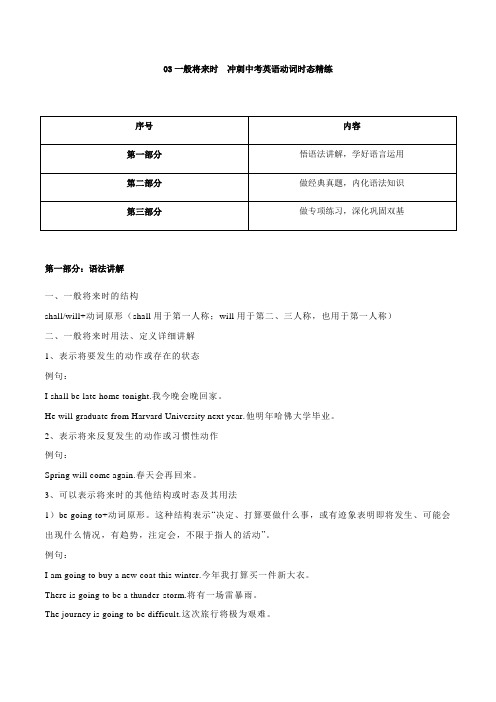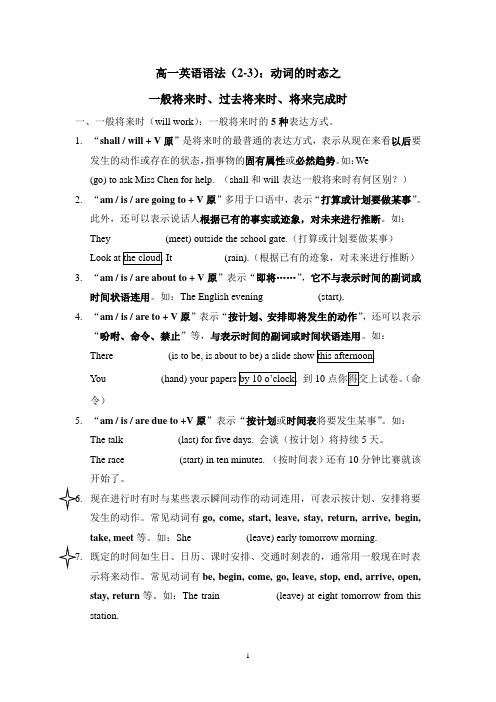时态详解:一般将来时
小学英语语法时态一般将来时详解

小学英语语法时态一般将来时详解一、概念一般将来时表示将来某一时刻的动作或状态,或将来某一段时间内经常的动作或状态。
一般将来时由助动词shall(第一人称),will(第二、三人称)+动词原形构成。
美国英语则不管什么人称,一律用will。
二、一般将来时的形式●will 常简略为'll,并与主语连写在一起,如:I'll,he'll,it'll,we'll,you'll,they'll。
●一般疑问句如用Will you…?其简略答语须是Yes,I will或No,I will not;如用Shall you…?(较少见)其简略答语须是Yes,I shall.或No,I shall not.。
三、一般将来时的用法1)表示将来的动作或状态一般将来时常与一些表示将来的时间状语连用,如:tomorrow(明天),next week(下周),from now on(从现在开始);in the future(将来)等。
2)表示将来经常发生的动作。
一般将来时表示将来某一时刻的动作或状态,其表达形式除了“shall(第一人称),will(第二、三人称)+动词原形构成”外,还有以下几种形式。
1)“to be going to+动词原形”表示即将发生的或最近打算进行的事。
例如:①It is going to rain. 要下雨了。
②We are going to have a meeting today. 今天我们开会。
2)go,come,start,move,sail,leave,arrive,stay等可用进行时态表示按计划即将发生的动作,例如:I'm leaving for Beijing. 我要去北京。
3)“be to+动词原形”表示按计划要发生的事或征求对方意见。
例如:①Are we to go on with this work?我们继续干吗?②The boy is to go to school tomorrow.这个男孩明天要去上学。
时态:一般将来时 小结

时态:一般将来时小结一般将来时表示将来某一时刻的动作或状态,或将来某一段时间内经常的动作或状态。
常常和表示将来的时间状语连用。
如:tomorrow(明天), next week(下周);in the future(将来)等。
一、一般将来时结构(一)常见结构1、will / shall 动词原形这种方法一般单纯地表示将来某个时间将要发生的动作或存在的状态。
will用于各种人称;shall只用于第一人称。
例如 : I will / shall go to visit him next week. 下周我将去拜访他。
What time shall we go there tomorrow? 明天我们几点去那儿?2、be going to 动词原形be going to 相当于一个助动词(其中be有人称和数的变化),与它后面的动词原形一起构成谓语。
用来表示近期将要发生的动作或存在的状态,以及计划、安排、打算要做的事。
例如: There is going to be a football match this afternoon.今天下午将有一场足球赛。
(二)常用句式1、用于"I expect, I'm sure, I think, I wonder 宾语从句"中。
Don't worry about the exam. I'm sure you'll pass.不要担心这次考试,我确信你会通过的。
I wonder what will happen.我不知道将会发生什么事。
I don't think the test will be very difficult.我想这次测验不会太难。
2、用于"祈使句 and陈术句"中。
Work hard and you will succeed.如果你努力,就会成功的。
Go at once and you will see her.马上去,你就会见到她了。
一般将来时态 中考详解

一般将来时态崔海英一定义:一般将来时态用来表示将要发生的动作或即将要做的事情,通常用"be going to +动词原形"或"will / shall +动词原形"来构成。
但在实际的阅读和写作中,还可以用其它方式表示将来时。
二一般将来时谓语动词形式可以分为五种:1"助动词shall / will +动词原形"表示将来某个时间要发生的动作或存在的状态。
其中shall通常用于第一人称,will 可用于各种人称,其否定形式缩写分别为shan't 和won't。
例如:He will come to see you the day after tomorrow. 他后天会来看你。
We shall / will go out for a drive if it's sunny. 如果天气好的话,我们将开车出去兜风。
2"be (is, am, are) going to +动词原形"表示即将发生的或打算最近要做的事情,主要用于口语。
例如:There is going to be a Japanese film this afternoon. 今天下午有一场日本电影。
We are going to have a swim this evening. 今天晚上我们要去游泳。
3、表示位移的动词go, come, leave, start, move, begin 等可用进行时态表示按计划即将发生的动作。
例如:He says he is leaving for Beijing tomorrow morning. 他说他明天早上将去北京。
Please wait for a moment. I'm coming soon. 请等一会儿,我马上就来。
4"be to +动词原形"表示按计划将要发生的事情或征求意见。
英语时态—一般将来时

英语时态—一般将来时(The future indefinite tense)讲解与练习参考答案在英语中,每句话都包含一定的时态,要学好英语就必须掌握英语中一些常用的时态。
在英语中,不同时间发生的动作和情况,要用不同的动词形式表示.这种不同的时间和不同的动词形式就叫做动词的时态. 换句话说,判断一个句子的时态,可以通过句子中的时间和动词的形态来判断。
下面我就一般将来时作一些讲解,如有不妥之处,请指教。
每种时态都有三个最基本的要素,分别是该时态的概念、结构、判断标志词。
一、一般将来时的概念:一般将来时表示将来某一时刻的动作或状态,或将来某一段时间内经常的动作或状态。
二、一般将来时的结构:(有两类不同的结构)Ⅰ主语+shall(在英式英语中,只用于第一人称)/ will(在英式英语中,用于第二、三人称) +动词(原形)【美式英语则不管什么人称,一律用will,因此美式英语只有一种结构:主语+ will+动词(原形)】肯定句式:主语+ will + 动词(原形)+ 其它. 【主语+ will = 主语’ll】否定句式:主语+ will + not + 动词(原形)+ 其它. 【will not = won’t】一般疑问句:will + 主语+ 动词(原形)+ 其它?注:英式英语中现在也趋向于所有人称都用will,因此,现在比较少见到I shall或We shall Ⅱ主语+ be going to +动词(原形)+ 其它.肯定句式:主语+ be going to +动词(原形)+ 其它.否定句式:主语+ be + not + going to +动词(原形)+ 其它.一般疑问句:Be + 主语+ going to +动词(原形)+ 其它?注:主语+ be going to + 动词原形‖表示即将发生的或最近打算进行的事。
三、一般将来时的判断标志词tomorrow , the day after tomorrow , next + 时间,in + 一段时间, in + 将来的年代, at once , this afternoon , this evening , soon , in the future , some day , from now on , and so on.四、一般将来时的基本用法1. ①表示将来发生的行为或存在的状态,常与tomorrow; in 2020;next week(year ,month), from now on,soon, some day, the day aftertomorrow,in(the)future, in five days(再过五天), in two weeks(再过二星期)等表示将来的时间状语连用。
英语语法:一般将来时解释集

英语语法:一般将来时解释大全一、基本定义一般将来时是英语时态的一种,表示将来的动作或状态。
它主要用于描述未来的计划、预测或期望发生的事情。
二、形式构成一般将来时的构成主要有以下几种形式:1. 基本结构:主语+ will /shall + 动词原形+ 其他成分。
这是最基本的一般将来时形式,表示将来的动作或状态。
2. be going to 结构:主语+ be(am, is, are)going to + 动词原形+ 其他成分。
这种结构表示计划或安排将要发生的事情,也可以表示根据目前的迹象或情况预测将会发生的事情。
3. be+动词不定式:主语+ be(am, is, are)to + 动词原形+ 其他成分。
这种结构表示计划或安排将来要做的事情。
4. be+动词ing:主语+ be(am, is, are)+ 动词ing形式+ 其他成分。
这种结构表示即将发生的动作,通常与“when”连用。
5. be+表示时间的介词短语:主语+ be(am, is, are)+ 表示时间的介词短语。
这种结构用于表示将来某个时间点的情况。
6. 将来时间状语:tomorrow, next week, in the future等以上就是一般将来时的主要构成形式。
需要注意的是,在具体使用时,应根据语境和上下文选择合适的构成方式。
三、用法场景1. 表达未来的计划或意图,例如:I will go to the beach next summer.2. 描述未来的预测或期望,例如:It will rain this afternoon.3. 在条件句中表示将来的结果,例如:If you study hard, you will pass the exam.四、与其他时态的区别1. 与现在进行时态的区别:现在进行时态强调正在进行的动作,而一般将来时态强调将来的动作或状态。
2. 与过去时态的区别:过去时态表示过去的动作或状态,与将来时间无关。
动词时态一般将来时的用法

动词时态一般将来时的用法动词时态包含了多种不同的形式,每种形式都传达了特定的时间信息。
在英语中,一般将来时是用来表达将来发生的动作、事件或状态的。
本文将详细介绍一般将来时的用法,并提供一些例句来帮助读者更好地理解。
一、一般将来时的定义一般将来时是用来表达明确的将来发生的动作或状态。
通常使用的助动词是will或shall,根据主语的不同而定。
二、一般将来时的构成1. 肯定句结构:主语 + will + 动词原形例如:- I will go shopping tomorrow.- He will travel to Europe next week.2. 否定句结构:主语 + will + not + 动词原形,或主语 + won't + 动词原形例如:- She will not visit her grandparents this weekend.- They won't attend the party.3. 疑问句结构:Will + 主语 + 动词原形?例如:- Will you join us for dinner?- Will they arrive on time?三、一般将来时的用法1. 表达自愿或意愿一般将来时常常用来表达主观上的决定、打算或愿望。
例如:- I will help you with your project.- He will volunteer at the local charity organization.2. 表示未来的计划或安排一般将来时可用于描述预定的时间表或安排。
例如:- We will have a meeting at 9am tomorrow.- They will arrive at the airport in the evening.3. 表示预测或推测有时,我们可以根据现有的证据或情况,使用一般将来时来推测未来可能发生的事情。
掌握时态一般将来时和过去将来时

掌握时态一般将来时和过去将来时一般将来时和过去将来时是英语中常用的两种时态形式,它们帮助我们描述将来发生的动作或事件,同时强调时间的关系。
在本文中,我们将重点探讨这两种时态的用法和相应的例句。
一、一般将来时(Simple Future Tense)一般将来时用来表达将来某个时间发生的动作或事件。
我们可以使用以下几种结构来构成一般将来时:1. 使用“will + 动词原形”构成句子,表示决定或预测的未来动作或事件。
例如:- I will visit my grandparents this weekend.(我会在这个周末去拜访我的祖父母。
)- He will be a doctor when he grows up.(他长大后会成为一名医生。
)2. 使用“be going to + 动词原形”表示计划、意愿或打算去做某事。
例如:- I am going to study abroad next year.(明年我打算出国留学。
)- She is going to have a party on Friday.(她打算在周五举办一个派对。
)3. 使用“shall + 动词原形”构成句子,表示“我将”,主要用于“我们”(“we”)和“我”(“I”)。
例如:- We shall meet at the park tomorrow.(明天我们将在公园见面。
)- Shall I help you with the bags?(我应该帮你拿行李吗?)二、过去将来时(Future in the Past Tense)过去将来时用于描述在过去某个时间点将来会发生的动作或事件。
我们可以使用以下结构来构成过去将来时:1. 使用“would + 动词原形”构成句子,表示过去某个时间点的将来动作。
例如:- He said he would come to the party.(他说他会来参加派对。
)- She told me she would give me a call later.(她告诉我她稍后会给我打电话。
一般将来时态知识点详解(初中英语专项复习) (4)

一般将来时态知识点详解(初中英语专项复习)知识点01 一般将来时主要构成形式【语法详解】一般将来时表示将来某个时间要发生的动作,事情或存在的状态,也表示将来经常或反复发生的动作或事情。
肯定句:1、主语+will/shall+动词原形。
2、主语+am/is/are+going+to+动词原形。
3、主语+am/is/are+to+动词原形。
4、主语+am/is/are+现在分词。
5、主语+am/is/are+going to+动词原形。
标志词:tomorrow, next day(week, month, year…),soon, in a few minutes, by…,the day after tomorrow。
详细用法:1. will/shall+动词原形,shall用于第一人称,常被will 所代替。
will在陈述句中用于各人称,在征求意见时常用于第二人称,will not=won’t,shall not=shan’t。
Which paragraph shall I read first? 我先读哪一段呢?Will you be at home at seven this evening? 今晚七点回家好吗?2. be going to +不定式,表示将来。
a. 主语的意图,即将做某事。
What are you going to do tomorrow? 明天打算作什么呢?b. 计划、安排要发生的事。
The play is going to be produced next month这出戏下月开播。
c. 有迹象要发生的事。
Look at the dark clouds, there is going to be a storm. 看那乌云,暴风雨快来了。
3. be +不定式表将来,按计划或正式安排将发生的事。
We are to discuss the report next Saturday. 我们下星期六讨论这份报告。
中考英语动词时态精练解析版--一般将来时

03一般将来时冲刺中考英语动词时态精练第一部分:语法讲解一、一般将来时的结构shall/will+动词原形(shall用于第一人称;will用于第二、三人称,也用于第一人称)二、一般将来时用法、定义详细讲解1、表示将要发生的动作或存在的状态例句:I shall be late home tonight.我今晚会晚回家。
He will graduate from Harvard University next year.他明年哈佛大学毕业。
2、表示将来反复发生的动作或习惯性动作例句:Spring will come again.春天会再回来。
3、可以表示将来时的其他结构或时态及其用法1)be going to+动词原形。
这种结构表示“决定、打算要做什么事,或有迹象表明即将发生、可能会出现什么情况,有趋势,注定会,不限于指人的活动”。
例句:I am going to buy a new coat this winter.今年我打算买一件新大衣。
There is going to be a thunder-storm.将有一场雷暴雨。
The journey is going to be difficult.这次旅行将极为艰难。
2)be going to和will等的比较。
①will表示说话人认为、相信、希望或假定要发生的事,不含任何具体时间,可以指遥远的将来。
而be going to指有迹象表明某事即将发生或肯定会发生,通常表示很快就要发生的事情。
例句:There is going to be a quarrel between them, I think.看来两人要发生争吵了。
He is going to get better.他的病就要好了。
②be going to和will均可表示“意图”;但事先考虑过的意图用be going to,而不是事先考虑的意图用will。
例句:A: Why have you torn the paper into pieces?B: I am going to rewrite it. (事先考虑的)A: It is a really big stone.B: I will help you to move it. (未经考虑的)3)现在进行时。
英语动词时态用法归纳:一般将来时

英语动词时态用法归纳:一般将来时一、一般将来时的构成一般将来时的由s hall / will+ 动词原形构成。
二、一般将来时的基本用法(1) 表示单纯的将要发生的动作或情况。
常与表示将来的时间状语连用。
如:Tomorrow will be Sunday. 明天是星期天。
They say that it will rain. 他们说要下雨。
I’ll be thirty-seven on my next birthday. 到下次生日,我就三十七岁了。
We won’t be free tonight. 今晚我们没空。
(2) 也可以表示临时决定要做的事。
如:—I thought I asked you to sweep the floor.—O h, I’m sorry. Mother, I will do it right now.—我原以为我让你扫地了。
—噢,对不起,妈妈,我就做。
—You have left the door open.—O h, so I have. I’ll go and lock it.—你忘了锁门。
—哦,是的。
我就去。
(3) 有时虽没有时间状语,但从意思上可以判断指将来的动作。
如:Who will take the chair? 谁当主席?You will pass the examination. 你会通过那个考试的。
The meeting won’t last long. 会开不了多久。
(4) 一般将来时有时还表示倾向和习惯性。
如:Oil will float on water. 油总浮在水面上。
Fish will die without water。
鱼离开水就会死掉。
The machine won't work because of a faulty connection. 机器电源线接错了,所以开不动。
三、表示将来时的几种方法(1) be going to+动词原形。
英语时态:一般将来时

英语时态:一般将来时一般将来时(simple future tense)表示将来某一时段的动作或状态,或将来某一段时间内经常的动作或状态。
一般将来时常常和表示将来的时间状语连用。
如:tomorrow, next week, in the future, in a year等。
Ⅰ. 句法结构【仅讨论陈述句和疑问句两种语式】:1.陈述句:A. 肯定形式:主语+be going to /will/shall +动词原形+其他B. 否定形式:主语+be not going to /will not/shall not+动词原形+其他注:a. 在直接在助动词后加not。
b. be going to结构中的be仅指am, is, are三个be动词。
c. will/shall+动原结构在谓语两态变化中无人称和数的变化。
d. 一般情况下,仅表示时态时,shall用于第一人称,will用于第二、三人称;表示说话人强烈意愿和语气时则用法相反。
2.疑问句:A. 一般疑问句:助动词提前即可①Be动词+主语+ going to +动词原形+其他②Will/Shall+主语+动词原形+其他B.特殊疑问句:特殊疑问词+一般疑问句(同上)3.被动语态:主语+ 助动词(结构) + be +动词过去分词【被动结构be done,时体现在助动词】➢两态变化例句参考下表(以will为例):Ⅰ. 主要用法及结构:1.【一般将来时表将来】一般将来时表示将要发生的动作或情况。
A.will/shall +动原I will(shall) arrive tomorrow.Will you be free tonight?B.be going to+动原a.表示计划、打算、准备做的事。
We are going to put up a building here.b.表示即将发生或肯定要发生的事。
I think it is going to snow.注:在一般将来时的句子中,有时有表示将来时间的状语,有时没有时间状语,这时要从意思上判断是否指未来的动作或情况。
英语三大一般时态之三——将来时

一般将来时英语三大一般时态之三: 一般将来时一、构成一、构成等时间状语连用。
一般将来时表示将来发生的事。
常与tomorrow, next year等时间状语连用。
二、用法二、用法通常有以下七种方式表示将来,注意它们各自的区别。
1、由will 加动词原形构成,当主语是第一人称时,也可以用shall 加动词原形。
如:Telephone me this evening. I’ll be at home. 今晚给我打电话,我会在家。
今晚给我打电话,我会在家。
I’ll (shall/will) do a better job next time. 下次我要干得好些。
下次我要干得好些。
注意:注意:1)will还可用来表示同意或“不能”。
如:Come and see me tomorrow. Yes,I will. 明天来找我。
——好的。
好的。
不会晚的。
一Don’t be late. 一No,I won’t. 别来晚了。
——不会晚的。
The car won’t start. 车开不了啦。
车开不了啦。
Oil and water will not mix. 油和水没法混在一起。
油和水没法混在一起。
2)在“祈使句+and/or+陈述句”句型中,陈述句中只能用will或情态动词加动词原形。
如:Work hard, and you will pass the exam. 努力学习,你就会通过考试。
努力学习,你就会通过考试。
3)在条件句中表示将来不用will,而用一般现在时、be going to(打算) 或be to(为人所控制的动作) 等。
若你见到在条件句中用了will,那will 就是表示“愿意”的情态动词。
如:Let her do that if she will. 如果她愿意,就让她那样做。
如果她愿意,就让她那样做。
2、be going to 加动词原形,表示主语的意图或打算将来做的事。
如:加动词原形,表示主语的意图或打算将来做的事。
一般过去时和一般将来时

英语动词时态详解:一般将来时一、一般将来时的定义一般将来时表示在现在看来即将要发生的动作或存在的状态。
常用时间副词tomorrow, soon或短语next year / week / month, in a few days, in the future, sometime 做状语。
如:What will you do this afternoon. 你今天下午干什么?We will have a meeting tomorrow. 我们明天要开会。
He is going to study abroad next year. 明年他要出国学习。
二、一般将来时的基本用法及构成一般将来时的基本用法是表示单纯的将来事实,由“will / shall + 动词原形”构成:We shall have a lot of rain next month. 下个月将下很多雨。
I think she will pass the exam. 我想他考试会及格的。
三、表示将来时间的几种常见方法英语中除了“will /shall+动词原形”表示半来时态外,还可以有以下多种方法:(1)用“be going to+动词原形”表示。
主要表示打算和预测:We are not going to stay there long. 我们不准备在那里多待。
(表打算)I’m afraid they’re going to lose the game.恐怕他们会赛输。
(表预测)Look, it’s going to rain.瞧,要下雨了。
(表预见)注:be going to 后接动词go和come时,通常直接改用其进行时态:Where is he going to go? / Where is he going? 他打算到哪里去?(2)用“be to+动词原形”表示。
主要表示按计划或安排即将要发生的动作;有时也表示命令、禁止或可能性:He is to leave for Beijing tomorrow. 他决定明天去北京。
高一英语语法(2-3):动词的时态之一般将来时、过去将来时和将来完成时

高一英语语法(2-3):动词的时态之一般将来时、过去将来时、将来完成时一、一般将来时(will work):一般将来时的5种表达方式。
1.“shall / will + V原”是将来时的最普通的表达方式,表示从现在来看以后要发生的动作或存在的状态,指事物的固有属性或必然趋势。
如:We __________ (go) to ask Miss Chen for help. (shall和will表达一般将来时有何区别?)2.“am / is / are going to + V原”多用于口语中,表示“打算或计划要做某事”。
此外,还可以表示说话人根据已有的事实或迹象,对未来进行推断。
如:They __________ (meet) outside the school gate.(打算或计划要做某事)(根据已有的迹象,对未来进行推断)3.“am / is / are about to + V原”表示“即将……”,它不与表示时间的副词或时间状语连用。
如:The English evening __________ (start).4.“am / is / are to + V原”表示“按计划、安排即将发生的动作”,还可以表示“吩咐、命令、禁止”等,与表示时间的副词或时间状语连用。
如:到10(命令)5.“am / is / are due to +V原”表示“按计划或时间表将要发生某事”。
如:The talk __________ (last) for five days. 会谈(按计划)将持续5天。
The race __________ (start) in ten minutes. (按时间表)还有10分钟比赛就该开始了。
现在进行时有时与某些表示瞬间动作的动词连用,可表示按计划、安排将要发生的动作。
常见动词有go, come, start, leave, stay, return, arrive, begin, take, meet等。
动词时态一般将来时

1、I am going to do my homework tonight. 我打算今天晚上做作业。 注:do前的my省略后句子仍正确,但是不省更地道。 2、Lily is going to sing and dance with Jack. Lily想要与Jack一起唱歌、跳舞。 3、Lily is going to go to Beijing with Jack. Lily打算与Jack一起去北京。 注:此句中有两个go to,为使句子简洁明了,省略句中表 示动作的一个保留时态的一个。因此上句改为: Lily is going to Beijing with Jack. 1、His father is about to go to H.K. by plane. 他交亲马上要坐飞机去香港。 注:by plane=by air 坐飞机 1、This meeting is to begin at 3:00 this afternoon. 这个会议将在今天下午3:00开始。 2、This train is to leave at 5:00. 这趟火车将在5:00离开。 1、I shall go to Beijing. 我将要去北京。(不知愿不愿意) 2、I will go to Beijing. 我愿意去北京。 注:通常shall用与 I 或 we ,而will用与 I、we之外的动 作发出者中。 3、I shall be a teacher. 我将成为一名教师。 4、She will be a beautiful. 我将变漂亮。 1、Flowers will die without water . 没有水花儿会死的。 1、I am coming . 我就来。 2、The old man is dying . 这个老人快要死了。 注:瞬间动词有:come go leave die begin
小学英语语法详解时态--一般将来时(1)(2)

小学英语语法详解时态——一般将来时(1)什么是一般将来时?一般将来时表示将来某一时刻的动作或状态,或将来某段时间内经常的动作或状态。
常用的基本形式有三种:will/shall结构;be going to结构;be about to结构一.will/shall 结构1.基本结构:主语+will/shall+ 动词原形表示将来发生的事情或是主语将要发生的行为,也用于征求对方的意见或表示客气的邀请。
It will be sunny tomorrow.明天将是个好天气。
(表示将来发生的状况)I will come back soon.我很快就回来。
(表示主语将要发生的行为)Will you please open the window?请你把窗打开,好吗?(表示征求对方的意见)Linda老师的小提醒★一般将来时任何主语都可以用will但书面语中第一人称常用shall。
I shall study harder at English.我将更加努力地学习英语。
Shall we go to see a film?我们去看电影好吗?★will,shall和主语都可以缩写成’llI’ll fly to London.我要坐飞机去伦敦。
They’ll visit the museum tomorrow.他们明天要参观博物馆。
2. 一般疑问句:将will/shall提到句首Will you go there?你要去那儿吗?3.否定句:在will/shall后加not,可缩写成won't/shan't陈述句:I will go there./I shall go there.我要去那儿。
否定句:I won't go there. /I shan't go there.我不去那儿。
4. 特殊疑问句:特殊疑问词+ will/shall +主语+动词原形+其他?What will he do this evening?今晚他准备做什么?(针对动词提问)When will you visit him?你什么时候去拜访他?(针对时间提问)Where will they have a running race?他们准备在哪里赛跑?(针对地点提问)小学英语语法详解时态——一般将来时(2)什么是一般将来时?一般将来时表示将来某一时刻的动作或状态,或将来某段时间内经常的动作或状态。
- 1、下载文档前请自行甄别文档内容的完整性,平台不提供额外的编辑、内容补充、找答案等附加服务。
- 2、"仅部分预览"的文档,不可在线预览部分如存在完整性等问题,可反馈申请退款(可完整预览的文档不适用该条件!)。
- 3、如文档侵犯您的权益,请联系客服反馈,我们会尽快为您处理(人工客服工作时间:9:00-18:30)。
时态详解:一般将来时一、一般将来时的定义一般将来时表示在现在看来即将要发生的动作或存在的状态。
常用时间副词tomorrow, soon或短语next year / week / month, in a few days, in the future, sometime 做状语。
如:What will you do this afternoon. 你今天下午干什么?We will have a meeting tomorrow. 我们明天要开会。
He is going to study abroad next year. 明年他要出国学习。
二、一般将来时的基本用法及构成一般将来时的基本用法是表示单纯的将来事实,由“will / shall + 动词原形”构成:We shall have a lot of rain next month. 下个月将下很多雨。
I think she will pass the exam. 我想他考试会及格的。
三、表示将来时间的几种常见方法英语中除了“will /shall+动词原形”表示半来时态外,还可以有以下多种方法:(1)用“be going to+动词原形”表示。
主要表示打算和预测:We are not going to stay there long. 我们不准备在那里多待。
(表打算)I’m afraid they’re going to lose the game.恐怕他们会赛输。
(表预测)Look, it’s going to rain.瞧,要下雨了。
(表预见)注:be going to 后接动词go和come时,通常直接改用其进行时态:Where is he going to go? / Where is he going? 他打算到哪里去?(2)用“be to+动词原形”表示。
主要表示按计划或安排即将要发生的动作;有时也表示命令、禁止或可能性:He is to leave for Beijing tomorrow. 他决定明天去北京。
Tell him he’s not to be back late.告诉他不准迟回。
(3)用“be about to+动词原形”表示。
主要表示即将要发生的事:He is about to leave. 他即将要离开。
Sit down, everyone. The film is about to start. 大家坐好,电影马上就要开发始了。
注:该结构通常不与具体的时间状语连用:误:He is about to leave soon [tomorrow].另外,该结构在美国英语中还可表示“打算”(主要用于否定句):I’m not about to lend him any more money.我不打算再借给他任何钱。
(4)用“be due to+动词原形”表示。
主要表示按计划或时间表将要发生某事:He is due to leave very soon. 他很快就要离开。
His book is due to be published in October. 他的书计划10月份出版。
(5)用“现在进行时”(即be+现在分词)表示。
主要表示按计划或安排要发生的事:The students are leaving on Sunday. 学生们星期日出发。
We’re having a party next week.我们下星期将开一个晚会。
注:该用法有时表示即将发生的动作:I’m leaving.我走了。
(6)用“一般现在时”表示。
表示按规定或时间表预计要发生的事:The train leaves at 7:25 this evening. 火车今晚7:25分开。
Tomorrow is Wednesday. 明天是星期三。
We have a holiday tomorrow. 我们明天放假。
注:在表示时间、条件等的状语从句以及某些名词性从句、定语从句等中,也用一般现在时表示将来意义,参见“时态详解:一般现在时”的有关用法。
四、三种将来时间表示法的比较(1) “will / shall+动词原形”与“be going to+动词原形”两者均可表示将来时间和意图,两者有时可换用:I think it’ll rain this evening. / I think it’s going to rain this evening. 我想今晚会下雨。
I won’t tell you about it. / I’m not going to tell you about it.我不会把这事告诉你的。
但有时有差别:①若是强调某个意图是经过事先考虑好的,则通常要用be going to;若是表示某个意图没有经过事先考虑,而是在说话的当时才临时想到的,则通常用will。
比较:"Ann is in hospital." "Oh, really? I didn’t know. I’ll go and visit her." “安住院了。
”“啊,真的吗?我还不知道。
我要去看看她。
” (临时想法,不能用be going to)"Ann is in hospital." "Yes, I know. I’m going to visit her tomorrow. “安住院了。
”“我知道,我打算明天去看看她。
” (事先考虑的意图,不能用will)②若是有迹象表明要发生某事,通常只用be going to,不用will:Look at those black clouds. It’s going to rain. 看那些乌云,要下雨了。
③带有时间或条件状语从句的主句通常不宜用be going to,而用will:When he comes back, I will tell him the news. 他回来时我就告诉他这个消息。
If he comes back, I will tell him the news. 他若回来我就告诉他这个消息。
(2)“be going to+动词原形”与“现在进行时”① be going to主要表示主观想法或意图,而现在进行进表示将来则主要已经强调作出的安排。
比较:I’m going to wash the car if I have time.若有时间我想洗洗车。
(主观想法)I’m picking you up at 6; don’t forget.我6点钟来接你,不要忘了。
(已作出的安排)②但是当要表示主观无法控制的预测时,通常要用be going to,不能用现在进行时态:It’s going to snow before long.不久会下雪。
Things are going to get better soon. 情况很快就会好起来。
③当表示坚持要(不要)某人做某事时,两者均可用:She’s taking [going to take] that medicine whether he likes it or not.不管她喜欢不喜欢,她都得吃那药。
You’re not wearing [going to wear] that skirt to school.你不可以穿那条裙子去上学。
(3) “be going to+动词原形”与“be to+动词原形”的区别两者均可表示按计划或安排要发生的动作,有时可互换(但be to比be going to正式):Where are we going to stay tonight? 我们今晚住哪里?I’m (going) to play tennis this afternoon.我打算今天下午打网球。
另外,be going to 还可表示预测,即根据已有迹象预测将要发生的动作,此时不能用be to:Look, it’s going to rain.看,要下雨了。
五、典型一般将来时考题详解【例1】Turn on the television or open a magazine and you __________ advertisements showing happy familiesA. will often seeB. often seeC. are often seeingD. have often seen分析:A。
这是“祈使句+and +陈述句”句型,祈使句相当于一个条件状语从句,and后的陈述句的谓语用一般将来时,这是一个较为固定的句型。
【例2】He was hoping to go abroad but his parents __________that they won’t support him unless he can borrow money from the bank.A. were decidingB. have decidedC. decidedD. will decide分析:B。
因宾语从句中的时态是一般将来时,主句中的谓语动词不可能是过去时态,排除选项A和D; 由语境判断,不是“将要决定”,而是“现在已经决定”,所以排除D,而选B。
【例3】—How can I apply for an online course?—Just fill out this form and we __________ what we can do four you.A. seeB. are seeingC. have seenD. will see分析:D。
表示将要发生的情况,自然是用一般将来时。
【例4】If their marketing plans succeed, they _________ their sales by 20 percent.A. will increaseB. have been increasingC. have increasedD. would be increasing分析:A。
由于if条件从句用的是一般现在时,所以其相应的主句宜用一般将来时。
【例5】Population experts predict that most people _________ in cities in the near future.A. liveB. would liveC. will liveD. have lived分析:C。
根据句中的in the near future可知要用一般将来时。
【例6】When I talked with my grandma on the phone, she sounded weak, but by the time we ________ up, her voice had been full of life.A.were hangingB.had hungC.hungD.would hang分析:C。
